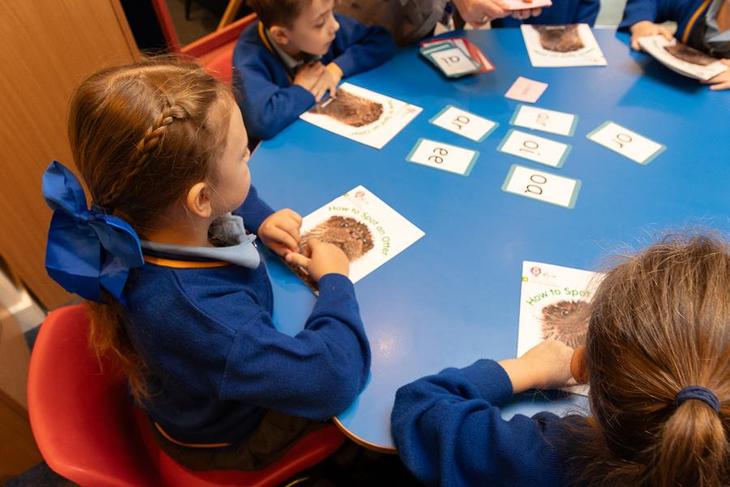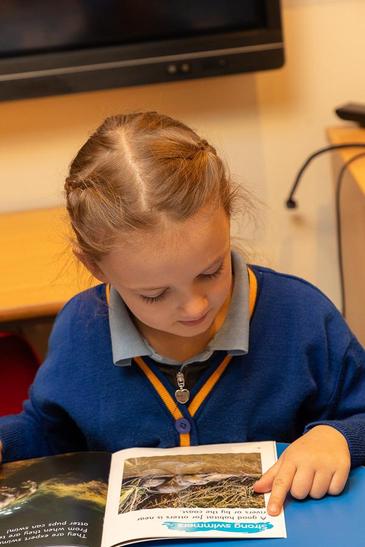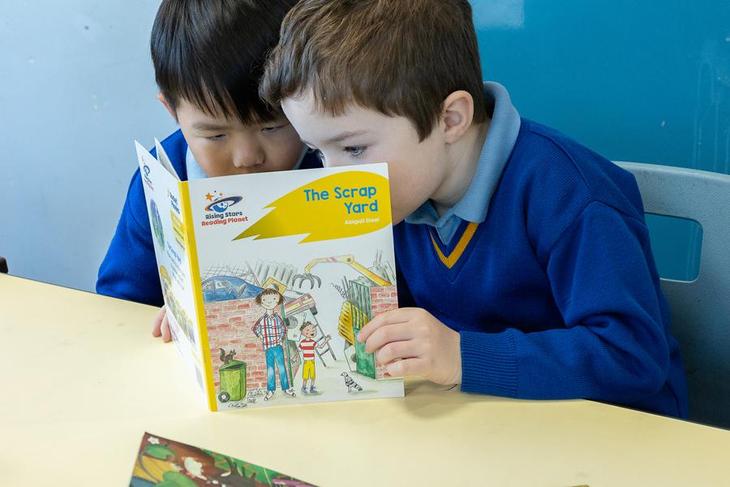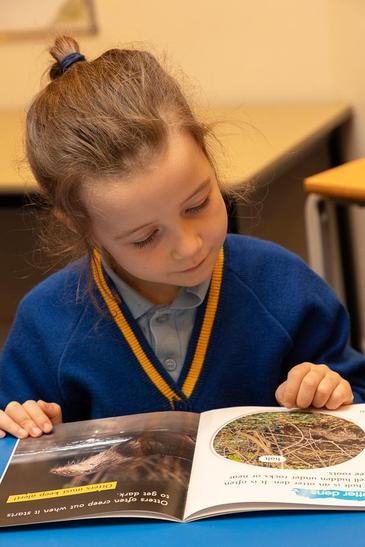Early Reading

Phonics and Early Reading Summary
Our Lady of the Wayside Catholic Primary School is determined that every child will learn to read, regardless of background, needs or abilities. We want our children to be fluent, confident readers. They will be exposed to a wealth of stories, poems, rhymes and non-fiction to develop their vocabulary, language comprehension and engender a genuine love of reading and a keen interest in a range of texts. We work to inspire them to become life-long readers who enjoy books and have a desire to read for pleasure.
We teach early reading through the systematic, synthetic phonics programme Little Wandle Letters and Sounds Revised. Right from the start of Reception children have a daily phonics lesson which follows the progression for Little Wandle Letters and Sounds and this continues in Year One to ensure children become fluent readers.
We teach phonics for 30 minutes a day. In Reception, we build from 10-minute lessons, with additional daily oral blending games, to the full-length lesson as quickly as possible. Each Friday, we review the week’s teaching to help children become fluent readers.
Children make a strong start in Reception: teaching begins early in the Autumn term. We follow the Little Wandle Letters and Sounds Revised expectations of progress (please click here for the progression).
Four new phonemes and their corresponding graphemes are taught (GPCs) each week and they are then used in the final lesson of the week to review the week’s learning. Children will also learn tricky words during these sessions.
In the Autumn and Spring term, Reception learn phase 2 and phase 3 GPCs and then will spend the final term learning phase 4.
Year 1 begin the Autumn term with revision of phases 2, 3 and 4 before learning phase 5, which will be completed by the end of the year.
Year 2 children will begin the year by revisiting phase 5 and other previously taught phases to ensure all children are completely confident with applying these GPCs in both their reading and also their writing.
Half termly assessments take place through Reception and Year 1 to help inform future teaching and help identify children who have gaps in their phonic knowledge and need additional practice. Daily assessment of learning also takes place within the classroom so staff can quickly identify any children who are in danger of falling behind and provide the appropriate daily ‘Keep Up’ intervention.
Reading Practice Sessions
Children in Reception, Year 1 and 2, read fully decodable books with an adult 3 times per week during our ‘Reading Practice’ sessions. These books are then allocated to children on the online Collins Big Cat ebook library for children to build their reading fluency and showcase their developing skills and phonetic knowledge to their parents/carers. These 3 reading practice sessions each have a different focus: decoding, prosody and comprehension. Our reading books in Reception, Y1 and Y2: Little Wandle Letters and Sounds Revised Big Cat books.
Reading for pleasure
Reading for Pleasure remains a whole school priority. Reading enjoyment has been reported as more important for children’s educational success than their family’s socio-economic status (OECD, 2002). We believe that a whole school Reading for Pleasure culture must be planned for and promoted throughout the school in a variety of ways, ensuring that all children have the opportunity to develop that real love of reading.
Every day, the teachers read aloud the class book (modelled reader) to the children. These texts are chosen carefully so there is a range of high quality, diverse texts to engage the children and appeal to a range of children.
Every classroom has an inviting book area that encourages a love for reading. The books have been chosen carefully in order to entice the children to read a wide range. We call these books ‘Grow with a Book’ and they help children to develop a growing knowledge of authors who connect children to thoughtful, engaging, and joyful experiences.
Supporting your child with reading
Although your child will be taught to read at school, you can have a huge impact on their reading journey by continuing their practice at home.
There are two types of reading book that your child will bring home in Reception, Year 1 and Year 2:
Reading practice book
This book has been carefully matched to your child’s current reading level. If your child is reading it with little help, please don’t worry that it’s too easy – your child needs to develop fluency and confidence in reading.
Listen to them read the book. Remember to give them lots of praise – celebrate their success! If they can’t read a word, ask them to decode (sound it out) and blend it. After they have finished, talk about the book together.
Sharing book
In order to encourage your child to become a lifelong reader, it is important that they learn to read for pleasure. The sharing book is a book they have chosen for you to enjoy together.
Please remember that you shouldn’t expect your child to read this alone. Read it to or with them. Discuss the pictures, enjoy the story, predict what might happen next, use different voices for the characters, explore the facts in a non-fiction book. In addition, after reading the book you can pick out some words and help them to expand their vocabulary by discussing alternatives for these words. The main thing is though that you have fun!
From Year 2 onwards, children will bring home a reading for pleasure book which they can read independently but can also still share with you too.
Little Wandle Parent Support Find out how to pronounce the sounds in each phase
|
|
|
|



